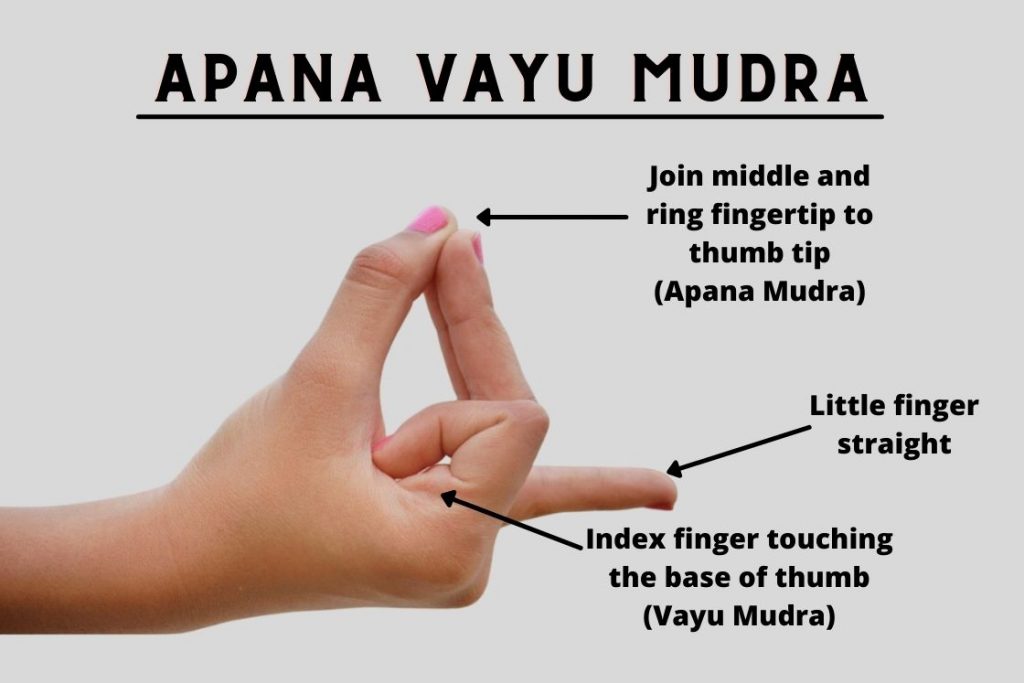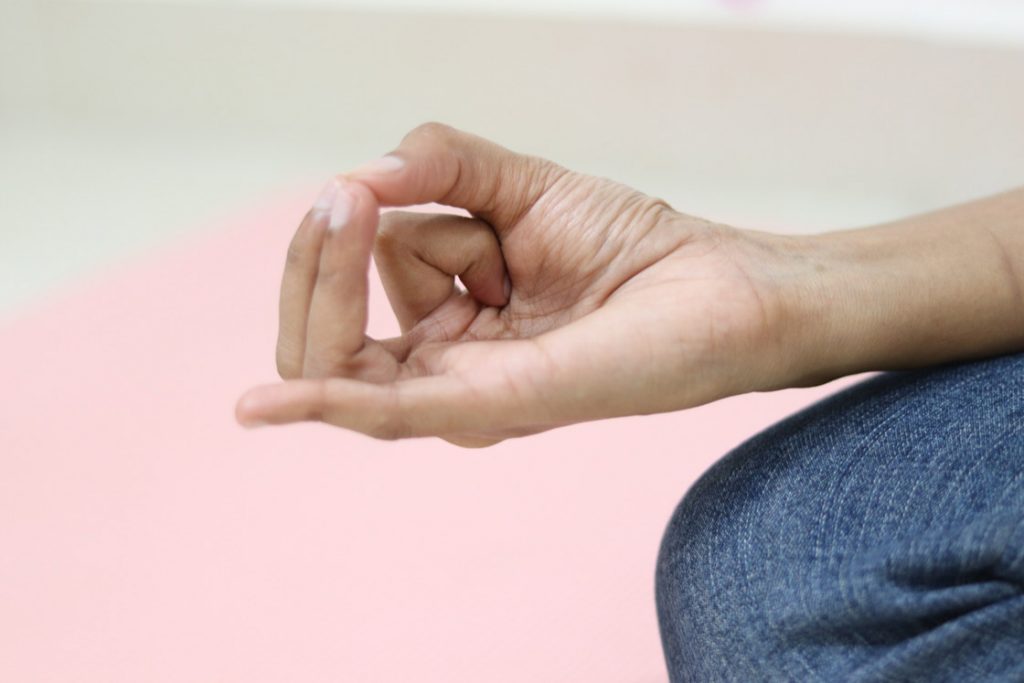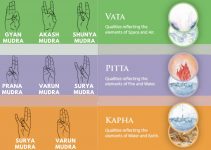
In today’s fast-paced world, our sedentary lifestyles and unhealthy dietary habits have significantly increased our susceptibility to various heart diseases. While adopting a healthier lifestyle is crucial, incorporating ancient practices like mudras can also play a pivotal role in enhancing our overall well-being. One such mudra renowned for its direct impact on heart health is the Apana Vayu Mudra.
The Apana Vayu Mudra holds a prominent place among mudras for its ability to alleviate symptoms associated with heart attacks and other cardiovascular ailments.
In this article, we will delve into the benefits of the Apana Vayu Mudra and explore how to perform it effectively to enhance heart health.
What is Apana Vayu Mudra?
Apana Vayu mudra is a therapeutic yoga hand mudra that is mostly concerned with healing heart-related diseases. It works to prevent heart attacks and reduces heart heaviness.
As the name suggests, Apana Vayu Mudra is formed by the combination of two hand gestures; Apana Mudra and Vayu Mudra.

- Apana Mudra – It’s formed by joining the tips of the thumb, middle, and ring finger. This mudra increases the fire and earth element which improves oxygen circulation to the arteries and improves the heart energy.
- Vayu Mudra – It’s formed by placing the tip of the index finger at the base of the thumb. The index finger represents the air element and through this gesture, you are essentially reducing pain and inducing relaxation.
Apana Vayu mudra is formed by joining the tip of the middle and ring finger to the thumb tip and then bending the index finger to the base of the thumb. This mudra increases the earth and space element which are good for the growth and structure of the body. It also reduces the excess of air. It is also called Mrit-Sanjeevni Mudra means one that brings along life from death.
If you are experiencing pain and sense an oncoming heart attack, immediately bring your hands to Apana Vayu mudra. The Vayu mudra part of this mudra will immediately unblock the artery and supply it with oxygen and the Apana mudra portion will remove these toxins in the form of clogs and blockages to improve blood circulation.
Duration
Practicing Apana Vayu Mudra for 10-15 minutes at any time of the day is recommended. Additionally, incorporating it into your meditation practice thrice daily or for longer durations of 30-45 minutes can amplify its benefits, promoting overall heart health and well-being.
How to Perform Apana Vayu Mudra?

Apana Vayu mudra can be practiced in any comfortable posture, however, in yoga, it’s advised to perform it with a seated meditative posture.
It is always preferable that you perform this mudra at Brahma Muhurata which is typically between 4-6 am. During this time, you will find the perfect environment to meditate along with fresh oxygen.
Follow these simple steps to perform Apana Vayu mudra in yoga;
- Firstly come in a seated meditation posture. For this you can sit in Easy Pose (Sukhasana), Lotus Pose (Padmasana), Hero Pose (Virasana), or Thunderbolt Pose (Vajrasana).
- Place your hands on the knees, palms facing up.
- On both hands, join the tips of the thumb, middle, and ring finger while bringing the tip of the index finger at the base of the thumb. Straight or slightly stretched the only remain finger i.e. little finger.
- Close your eyes and take deep breaths. Focus on your heart chakra. If you want, you can chant a beej mantra for enhancing your concentration.
- Throughout the meditation, your back should remain straight and your shoulder should be away from the ears to avoid slouching.
Hold Apana Vayu mudra for 15 minutes in one sitting. One can hold it for a longer duration if comfortable, or when doing it specifically for some heart conditions. To come out of the pose, firstly straight up the index finger and then release the contact of the middle and ring fingertips. Rub hands together quickly and cup warm hands over your eyes to feel the heat you have generated.
Apana Vayu Mudra Precautions
- Practice in Moderation: Perform this mudra in moderation to prevent elemental imbalances.
- Gentle Pressure: Apply light, comfortable pressure on the fingertips to avoid strain or discomfort.
- Kapha Dosha Awareness: Individuals with a dominant Kapha constitution or Kapha imbalance should practice with caution.
- Combine with Other Practices: Integrate this mudra with other yoga practices for overall harmony and balance.
- Consult Healthcare Providers: Seek advice from a healthcare provider before starting, especially if you have chronic health conditions or are undergoing specific treatments.
Apana Vayu Mudra Side Effects
- Elemental Imbalance: Excessive practice can lead to an imbalance of earth and fire elements, potentially causing lethargy or digestive heat.
- Kapha Dosha Aggravation: May not be suitable for individuals with a dominant Kapha constitution or those experiencing Kapha imbalances, leading to congestion, sluggishness, and weight gain.
- Temporary Discomfort: Beginners may experience temporary discomfort or strain in fingers and hands.
- Over-Reliance: Relying solely on this mudra for serious health issues without seeking medical advice can be dangerous.
- Excessive Pressure: Applying too much pressure on the fingertips can cause discomfort; practice with gentle pressure.
Apana Vayu Mudra Benefits
Apana Vayu Mudra can bring about a range of positive physical and mental changes. From countering the symptoms of heart attacks, hypertension, diabetes, and asthma to calming the mind and promoting good sleep, this mudra is truly beneficial.
Practicing Apana Vayu Mudra helps cleanse the circulatory system, improving lung function. It is also very effective in relieving acidity, constipation, and gastric discomfort.
Here are some science-backed and anecdotal benefits:
1. Improves physical and emotional heart health
Apana Vayu mudra is also called the Mrit-Sanjeevni Mudra as it directly impacts heart health. This mudra aids in the redirection of prana towards the heart, thereby managing any heart-related issues.
If you practice the mudra when you feel pain in the chest, which is one of the symptoms of heart attack, Apana Vayu mudra can give you the time frame to reach out for medical help. This has also been proven in a study published in 2017. By activating the parasympathetic nervous system it can help in normalizing the heart rate and blood pressure.
Apana Vayu mudra also helps remove any blockages in the blood veins, which keep blood pressure in control and prevents recurrence of heart attacks. If you have a weak pulse, which is sometimes the result of heart palpitations, practicing Apana Vayu mudra can normalize the pulse rate.
On the emotional plane, Apana Vayu mudra opens up the heart chakra which helps in releasing any heaviness or pent up feelings. It makes the practitioner ready to receive compassion, love and kindness from the outside world.
2. Provides relief from acidity, gas and digestive problems
Apana Vayu is one of the five vayus which facilitates the movement of downward flowing air. The overabundance of it causes stomach troubles. Apana Vayu mudra reduces this extra air, therefore, aiding in the indigestion problems such as ulcer, gastritis, or acid reflux.
3. Detoxify the body
Apana Vayu mudra is also called detoxification mudra. The main elements of this mudra, fire and ether, are responsible for the detoxification process in the body.
Sweat and excretion of waste are two of the common ways through which the body detoxifies. By balancing the fire and space element, Apana Vayu mudra helps in promoting detoxification through these channels. Issue of constipation and urine retention also gets cured.
Other known benefits of Apana Vayu mudra include the following:
- Improves respiratory functions
- Helps manage anxiety and stress
- Improves liver and gall bladder functioning which may help in countering diabetes
- Activates parasympathetic nervous system to calm the mind quickly
- Helps treat insomnia symptoms and induce restful sleep
- Promotes mental well-being and reduce negative feelings such as anxiety, irritation, anger, etc.
- Balances three doshas – Vata, Pitta, and Kapha
- Helps in managing bodily pains such as migraine, headaches, back pains, menstrual cramps, etc.
Conclusion
The elements – fire, earth, space, and air are brought together in the Apana Vayu mudra, which is thought to have healing advantages. People who have previously suffered from heart problems should practice Apana Vayu mudra on a daily basis. Even if you don’t have any medical problems, Apan Vayu mudra can assist you to keep your heart healthy.





I am 63 years old male. I have got fatty liver on Sonography, SGOT ration is 1.43, Hyperlipidimia, hypertension (on medication) Tachycardia (on medication), prostrate enlargement, can i do regularly Apana Mudra for 45 minutes.
My friend suffered Heart Attack and also having pace maker implant.Weather he can practice Apana Vayu Mudra with pace maker implant.
Is it recommended to do Kapaal Bhaati with Apana Vayu mudra, or just breathe in & out genetally
Can more than one Mudra be done in one sitting….or is there a gap needed….if yes how much
2…Are there any specific mudras that should not done in one day
Ideally, keeping a gap of 1 minute between two different mudras one after another is good.
Different mudras have their own contraindications; when they should be avoided and what time of the day (you can check the mudras list here). Based on the understanding of effects and contraindications, you can choose whether a mudra should be practised or not.
Is this scientifically effective? And when I will get the result by doing this mudra?
Can practicing Apan vayu mudra increase weight in person with excess kapha ? In that case should that person continue this mudra
Jayashanker
I am 80 years old. I have undergone 3 angioplasty. I would like to know which mudra is suitable for me
How many types of mudras can u safely practice in a day.
If u do 3 or 4 different mudras (ie.45 mins per mudra), will it be too much and harmful??
I started the Apana Vayu to regulate and slow down heart rate, I find its even beating faster than before.
If it’s supposed to lower blood pressure, maybe its not correct for me as I have low blood pressure but with a fast irregular heartbeat.
Can u pls advise which mudra I should do in view of my heart condition?
Thank you soo much!
Can apan vayu mudra beneficial in neck atherosclerosis? Neck arteries have mild plaque
Is setu bandasana safe and risk free for high bp patients as the blood rushes to the brain while we raise our neck to buttocks ? We donot know how much blood can hold in our brain.
Very interesting information, God bless you.
Doing appan mudra for 40 minutes doesn’t give me complete relief though I feel better. Can I do it for more time. I mean for 20 minutes three times a day. I have been generally doing this mudra after food Is It harmful or less beneficial this way
I have been practising bhramari pranayama and anuloma viloma pranayama for than five years. I am a hard worker also. but blood pressure indicates 190-100 reading, dangerous situation. I cannot understand how it happened. My father had high BP controlled by medicine. I am 68 years of age
Hi, please consult your doctor for any personal advice, or I must say, for better consultation! However, in older people, high blood pressure is very common, even though you’re physically sound very well.
Bharmari, anulom vilom, and Apana Vayu Mudra, all are safe and beneficial in reducing heart rate and HBP. You will definitely get its benefits; keep practicing it and consult your doctor.
Is there any history for blockage in an artery of the heart after doing this Apana Vayu mudra?
I don’t think so. In contrast to this, this mudra relieves the hardening or clogging of the arteries (arteriosclerosis) as it flushes out excess air that causes constriction of heart arteries.
A healthy person shall do Apana Vayu mudra regularly or are there any restrictions? Plz reply
No, there aren’t any specific restrictions for Apana Vayu Mudra. One can do it regularly for a healthy heart.
How long to wait for food after doing Apan Vayu Mudra? Can anyone please suggest.
Can I do Apana vayu mudra while walking?
Though the body is advised ‘to be still’ while doing any mudra but if you feel you can fix your fingers in this mudra without any shaking, then you can do it while walking slowly.
Dear sir/Madam
I am Vijay and I am suffering from high bp since I was 24. Now I am 34. I do apanvayu mudra.(50 ujjayi breath). Please guide me to cope up with this problem in perspective of apan vayu mudra and other mudra .
Thanx
Along with Apana Vayu Mudra, do regular squeezing of middle fingers of both hands for 5 minutes. Pressure should be moderate and equal from root to the tip of the middle finger. This will surely help you in reducing BP.
Gyan mudra is also beneficial to down the high bp.
Kya uth jane ke turant baad mudra ki ja sakti he… Bina toilet jaye ya fresh hue bager?
Ji Haan, you can do mudras before such morning activities but its better results come if you do it after getting fresh in morning.
But I have been informed that Apana Vayu mudra should never be done while walking. Is this true? Also, I have heard that one should not do this mudra after a meal.
Ramesh, Please share with us some valid resource if you’re sure that Apana Vayu mudra should never be done while walking. We don’t think there is any harm in practicing Apana Vayu mudra while walking. After a heavy meal, you can always give your body a little time to relax & then can practice it.
what are the effects of doing Apaan Vayu Mudra while walking.
Practicing Apana Vayu mudra while walking or before running increases the lung capacity that lets you breathe easier & eventually reduces the risk of heart diseases. Also, the back pain problem after a long walk can be cured if performed this mudra.